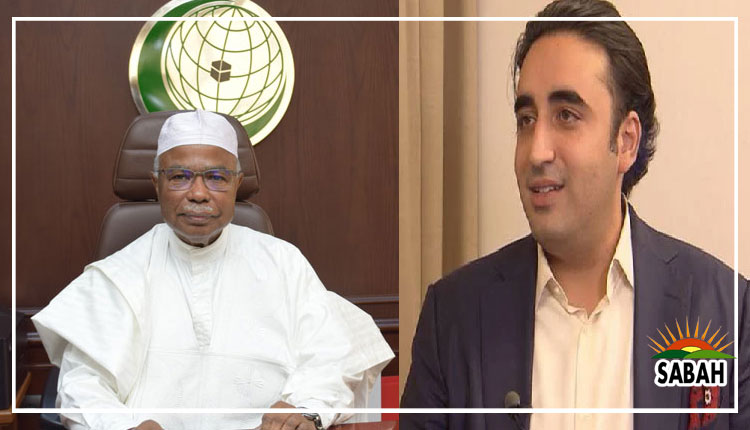Bilawal holds telephone conversation with OIC Secretary General Hissein Brahim Taha
ISLAMABAD, May 12 (SABAH): Foreign Minister Bilawal Bhutto Zardari held a telephone conversation on Thursday with OIC Secretary General, Hissein Brahim Taha, to apprise him of the latest situation in the Indian Illegally Occupied Jammu and Kashmir (IIOJK) in the wake of the report of the so-called “Delimitation Commission” in the occupied territory.
Dismissing the report as another outrageous attempt by India at political gerrymandering, the Foreign Minister said that by redrawing electoral boundaries blatantly favouring the Hindu-dominated constituencies, the so-called “Delimitation Commission” has validated the worst fears of the Kashmiri people that the BJP Government in India sought to disempower and disenfranchise them by altering the demographic structure of the IIOJK with a view to converting the Muslim majority into a minority.
The Foreign Minister said this illegal and farcical attempt was in contravention of the relevant UN Security Council resolutions, international law, and the 4th Geneva Convention which imposes certain obligations on occupying powers including not to change the demographic structure of the occupied territories. Pakistan and the Kashmiris categorically rejected it.
Commending the OIC’s long-standing and principled position on the Jammu and Kashmir dispute, the Foreign Minister noted that the various resolutions and declarations including those adopted during the 48th Session of the Council of Foreign Ministers (CFM) in Islamabad in March 2022 unequivocally rejected the illegal and unilateral Indian actions of 5 August 2019 and all subsequent steps, to perpetuate its occupation of the IIOJK.
The Foreign Minister said that in its capacity as the CFM Chair, Pakistan will continue to sensitize the international community of the plight of the long-suffering Kashmiri people.
The OIC Secretary General reaffirmed steadfast support to the just struggle of the Kashmiris for their inalienable right to self-determination, in accordance with relevant UN Security Council and OIC resolutions, and the wishes of the Kashmiri people.
Meanwhile Foreign Minister Bilawal Bhutto Zardari participated in the 2nd Global Covid-19 Summit co-hosted, virtually, by the United States, Belize, Germany, Indonesia, and Senegal. President of the United States opened the Summit with his address followed by remarks of President of Senegal and Indonesia, Chancellor of Germany, and Prime Minister of Belize.
Speaking at the second session of the Summit, “Vaccinate the World- Getting Vaccines to the Most Vulnerable”, the Foreign Minister underscored that any approach to deal with pandemic must be grounded firmly in scientific evidence and logic; responses, monitoring and evaluation should be guided by established methods of epidemiology and community medicine. It was added by the Foreign Minister that our responses must be customized to the specific and peculiar needs of our societies. Every country and region will have to devise its own strategy. One-size-fits-all approach cannot be used to battle such pandemics. By way of example, China’s dynamic Zero-COVID approach, rooted in China’s realities, was particularly successful in eliminating the virus, saving countless lives and swift economic recovery.
The Foreign Minister emphasized that international cooperation and coordination was of fundamental importance to the success of national efforts. Health security, especially in times of pandemic, was indivisible. Microorganisms did not recognize Nation-States. “For them, we were all the same. To counter them, we must act as one,” he stressed.
The Foreign Minister appreciated that the U.S. was generous in providing 62 million vaccines to Pakistan, and China, from the outset, supported us tremendously. Pakistan, too, provided COVID-related assistance to countries that needed it, he underlined.
Bilawal Bhutto Zardari underlined the importance of developing synergies with specialized agencies such as WHO, UNICEF, GAVI and COVAX to battle the scourge. It was reiterated that Pakistan will continue to work closely with those institutions to bolster its national response.
To collectively fight this menace, Foreign Minister stressed that we should avoid finger-pointing and politicking, both at national and international levels, as well as profiteering and rumor-mongering, especially when it related to undermining the scientific evidence and hard data. The Foreign Minister emphasized that the fight against COVID must promote international cooperation and solidarity. It has been evidently clear in the last two years that our survival hinges on our ability to work together and platforms like these should help forge greater unity among humanity so that the battle against this menace can be won decisively.












